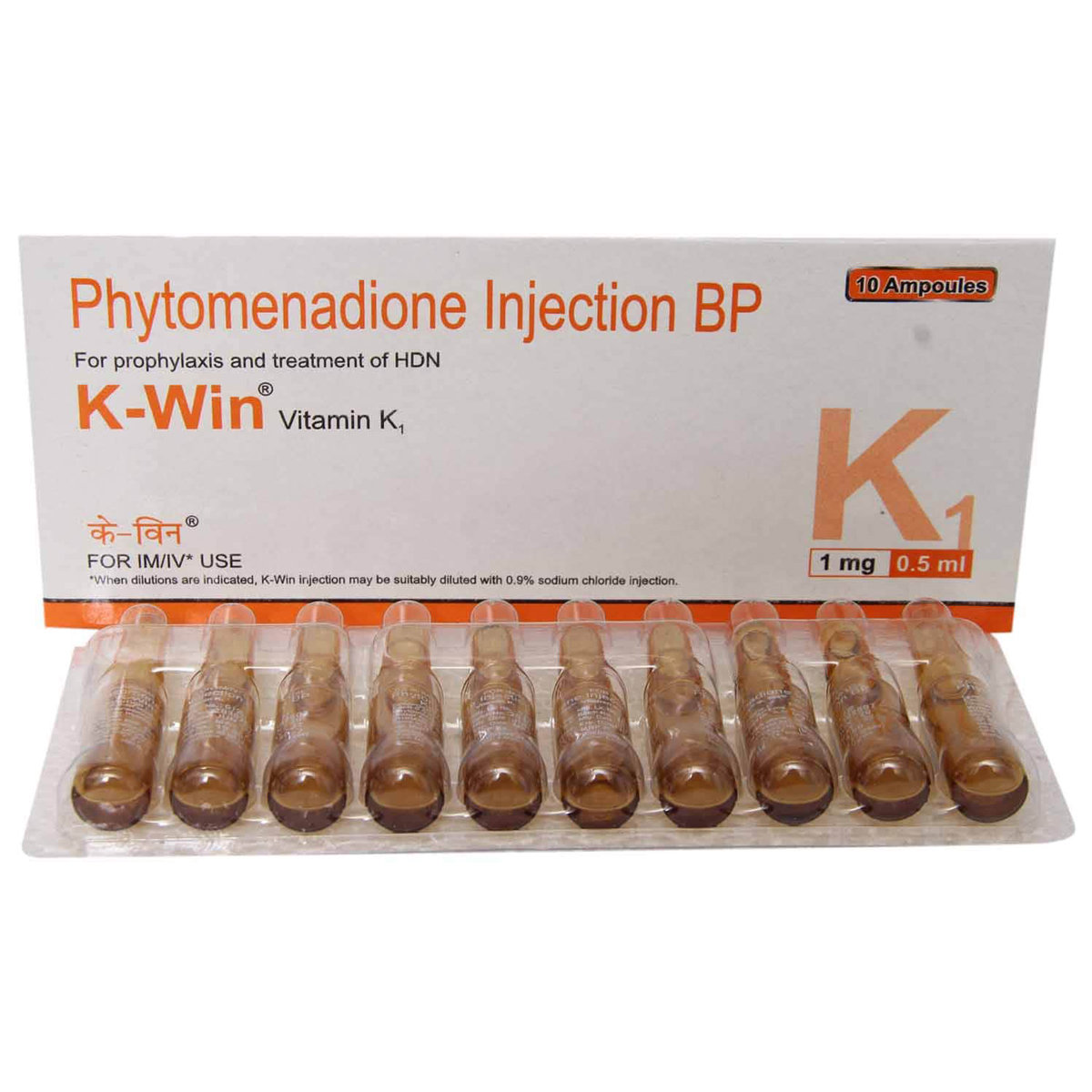KIP Injection 0.5 ml
MRP ₹49.5
(Inclusive of all Taxes)
₹7.4 Cashback (15%)
Provide Delivery Location
Online payment accepted
 Prescription drug
Prescription drugWhats That
Composition :
Manufacturer/Marketer :
Consume Type :
Expires on or after :
Return Policy :
About KIP Injection
KIP Injection belongs to the class of medications called ‘vitamins’ used to prevent and treat bleeding after using anti-coagulants and vitamin K deficiency bleeding. It is indicated in anti-coagulant-induced prothrombin deficiency, hypoprothrombinemia due to antibacterial therapy, hypoprothrombinemia due to limited absorption or synthesis of vitamin K, and other drug-induced hypoprothrombinemia.
KIP Injection contains ‘Phytomenadione’, man-made vitamin K1, which works by helping the body make blood clotting factors that prevent bleeding.
In some cases, KIP Injection may cause side effects such as dizziness, flushing, cyanosis (bluish skin discolouration), sweating, and altered taste. Most of these side effects do not require medical attention and gradually resolve over time. However, if the side effects persist or worsen, please consult your doctor.
Inform your doctor if you are allergic to any components in KIP Injection . Consult your doctor if you are pregnant, planning to become pregnant, or breastfeeding. The safety and effectiveness of KIP Injection have not been established in neonates. Let your doctor know if you use any prescription/non-prescription medications, including vitamin/mineral supplements or herbal products.
Uses of KIP Injection
Directions for Use
Key Benefits
KIP Injection belongs to the class of medications called ‘vitamins’ used to prevent and treat bleeding after using anti-coagulants and vitamin K deficiency bleeding. It is indicated in anti-coagulant-induced prothrombin deficiency, hypoprothrombinemia (deficiency of blood clotting substance, prothrombin) due to antibacterial therapy, hypoprothrombinemia due to limited absorption or synthesis of vitamin K such as obstructive jaundice, celiac disease, cystic fibroids of the pancreas and intestinal resection, and other drug-induced hypoprothrombinemia. KIP Injection is used in children above one year who have liver disease or low vitamin K levels due to illness. KIP Injection contains ‘Phytomenadione’, man-made vitamin K1, which works by helping the body make blood clotting factors that prevent bleeding.
Storage
Drug Warnings
Do not take KIP Injection if you are allergic to any components. Inform your doctor if you have a cholestatic disease, artificial heart valve, seizures, liver or kidney problems. Consult your doctor if you are pregnant or breastfeeding. The safety and effectiveness of KIP Injection have not been established in neonates. Keep your doctor informed about your health condition and medications to rule out any side effects/interactions.
Diet & Lifestyle Advise
- Eat a balanced diet rich in vegetables and whole fruits.
- Include green leafy vegetables, soybean and canola oil, and fortified meal replacement shakes.
- Avoid smoking and alcohol consumption.
- Exercising regularly helps in improving overall health.
- Rest well, and get plenty of sleep.
- Meditation and yoga can help lower stress.
- Avoid processed and fried food.
Side Effects of KIP Injection
- Dizziness
- Flushing
- Cyanosis (bluish skin discolouration)
- Sweating
- Altered taste
Habit Forming
Therapeutic Class
All Substitutes & Brand Comparisons
RX
Out of StockWeldion 1mg Injection
Welgenic Pharma
₹17.9
(₹3.22/ 1ml)
96% CHEAPERRX
Out of StockKvi 1mg Injection
Dewcare Concept Pvt Ltd
₹16
(₹14.4/ 1ml)
83% CHEAPERRX
Out of StockOl-K Injection 0.5 ml
Olcare Laboratories Pvt Ltd
₹22
(₹22.0 per unit)
75% CHEAPER
Author Details
We provide you with authentic, trustworthy and relevant information
FAQs
Disease/Condition Glossary
Hypoprothrombinemia: It is characterised by a deficiency of the blood-clotting substance called prothrombin, which leads to prolonged bleeding. This condition is usually associated with vitamin K deficiency. Symptoms include easy bruising, abnormal bleeding, heavy bleeding, and nose bleeds.
Vitamin K deficiency: It is caused by decreased production of vitamin K in the body and insufficient dietary intake, inadequate absorption, and decreased storage of vitamin K. Symptoms of vitamin K deficiency include easy bruising, nose bleeds, and bleeding caused by the inability to form clots.

Have a query?
Alcohol
Safe if prescribed
It is not known if alcohol interacts with KIP Injection . Please consult your doctor if you have any concerns.
Pregnancy
Consult your doctor
Inform your doctor if you are pregnant. Your doctor will prescribe this medicine only if the benefits outweigh the risks.
Breast Feeding
Consult your doctor
Inform your doctor if you are breastfeeding before receiving KIP Injection . Your doctor will prescribe only if the benefits outweigh the risks.
Driving
Safe if prescribed
KIP Injection generally does not affect your ability to drive. However, drive or operate machinery only if you are alert.
Liver
Consult your doctor
If you have liver problems, inform your doctor before taking KIP Injection .
Kidney
Consult your doctor
If you have kidney problems, inform your doctor before taking KIP Injection .
Children
Safe if prescribed
KIP Injection is safe for use in children if prescribed by the doctor. The safety and effectiveness of KIP Injection have not been established in neonates.







_0.jpg?tr=q-85)

